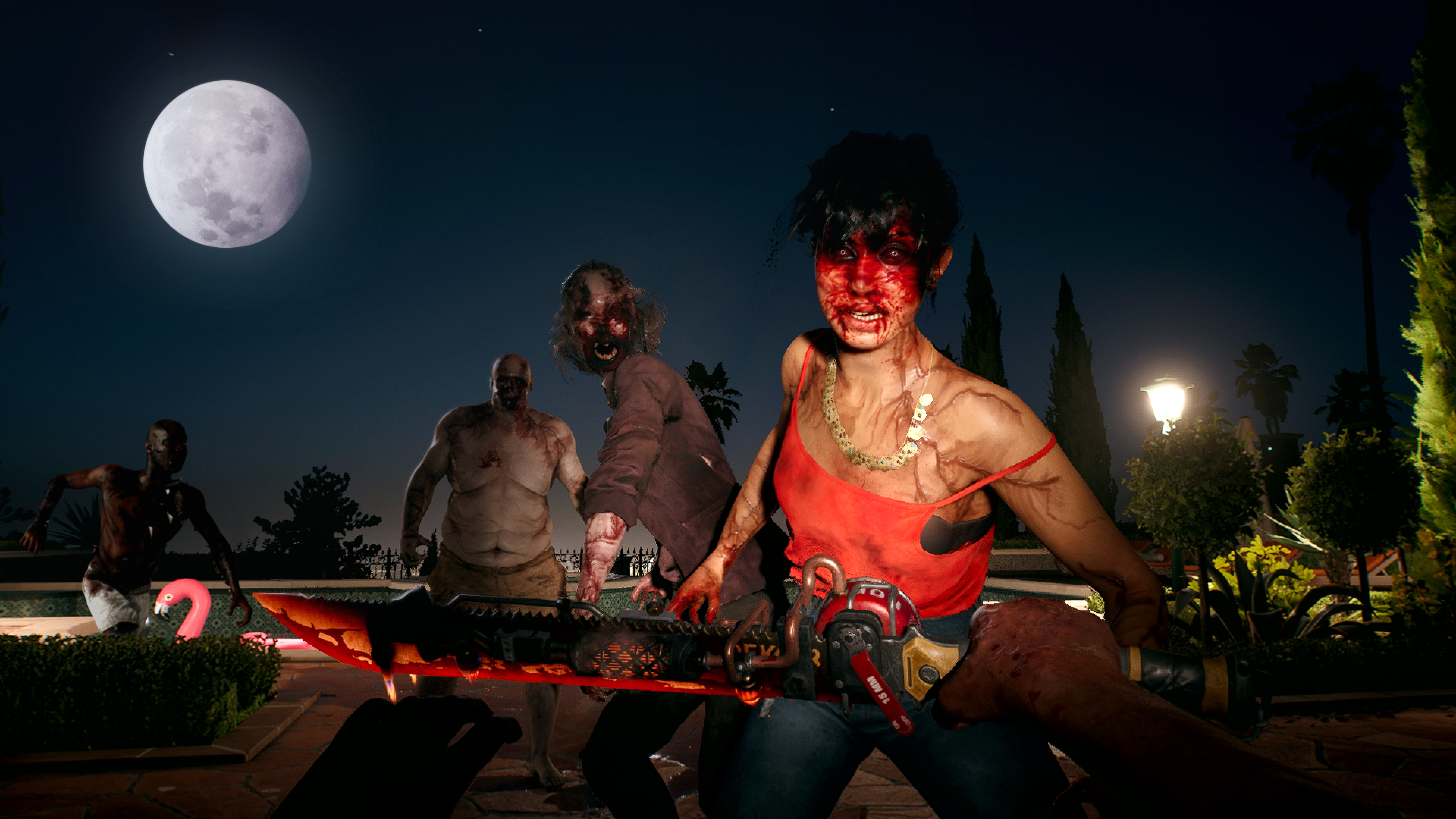darkwebSTREAMER is a "narrative roguelike" that interrogates the voyeuristic horror fan in us all
Interview | Chantal Ryan talks 90s cannibal forums, social decay, and how her upcoming horror RPG straddles time and place
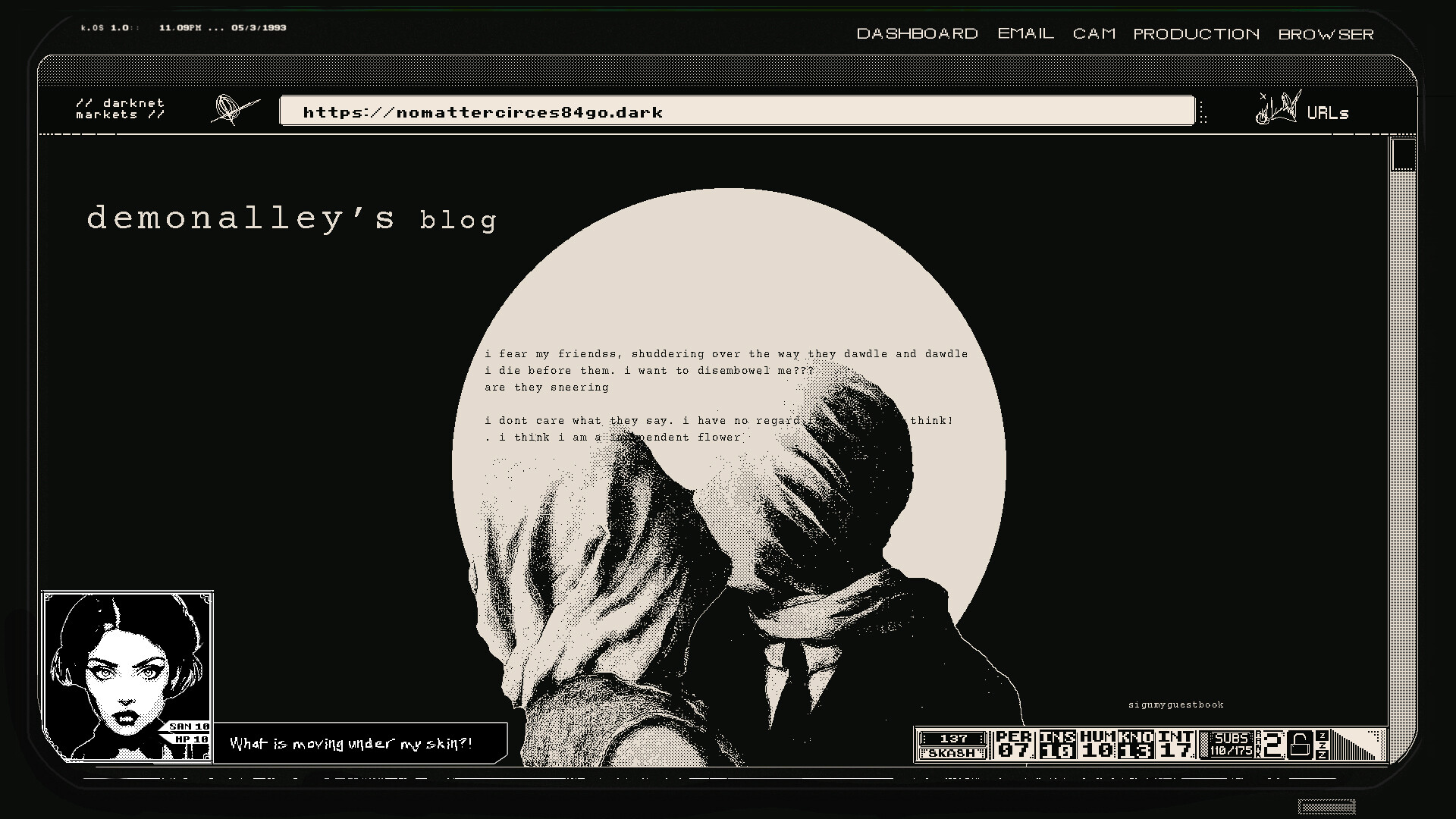
"I often say that my computer raised me." Chantal Ryan's sentiment might ring true for many of us, and that intimate relationship is something that fuels her. "In many ways," she explains, "darkwebSTREAMER is a love letter to the old internet, which was really my era. It's almost like my town, my neighborhood, the street where I grew up."
Right down to its eerie promotional website, HTML codes hand-written by Ryan just as she did as a 10-year-old part time web designer in the 90s, darkwebSTREAMER is an analog horror game rooted in the oldest, gnarliest corners of the internet. The idea came to Ryan in a dream, but making it was always going to be an unconventional experience.
"I was not a game maker," she confesses, describing her craft as being primarily an experimental horror writer, creative, and poet. "I had this fully-developed vision of this game come into my head. So it was more of an, 'oh shit, I've got to figure out how to make video games so I can make this'." But there's more to darkwebSTREAMER than paranormality and weirdos on the internet; it's about secrets, and venturing to the deepest parts of your psyche (as well as the dark web) to uncover them.
Plumbing the depths
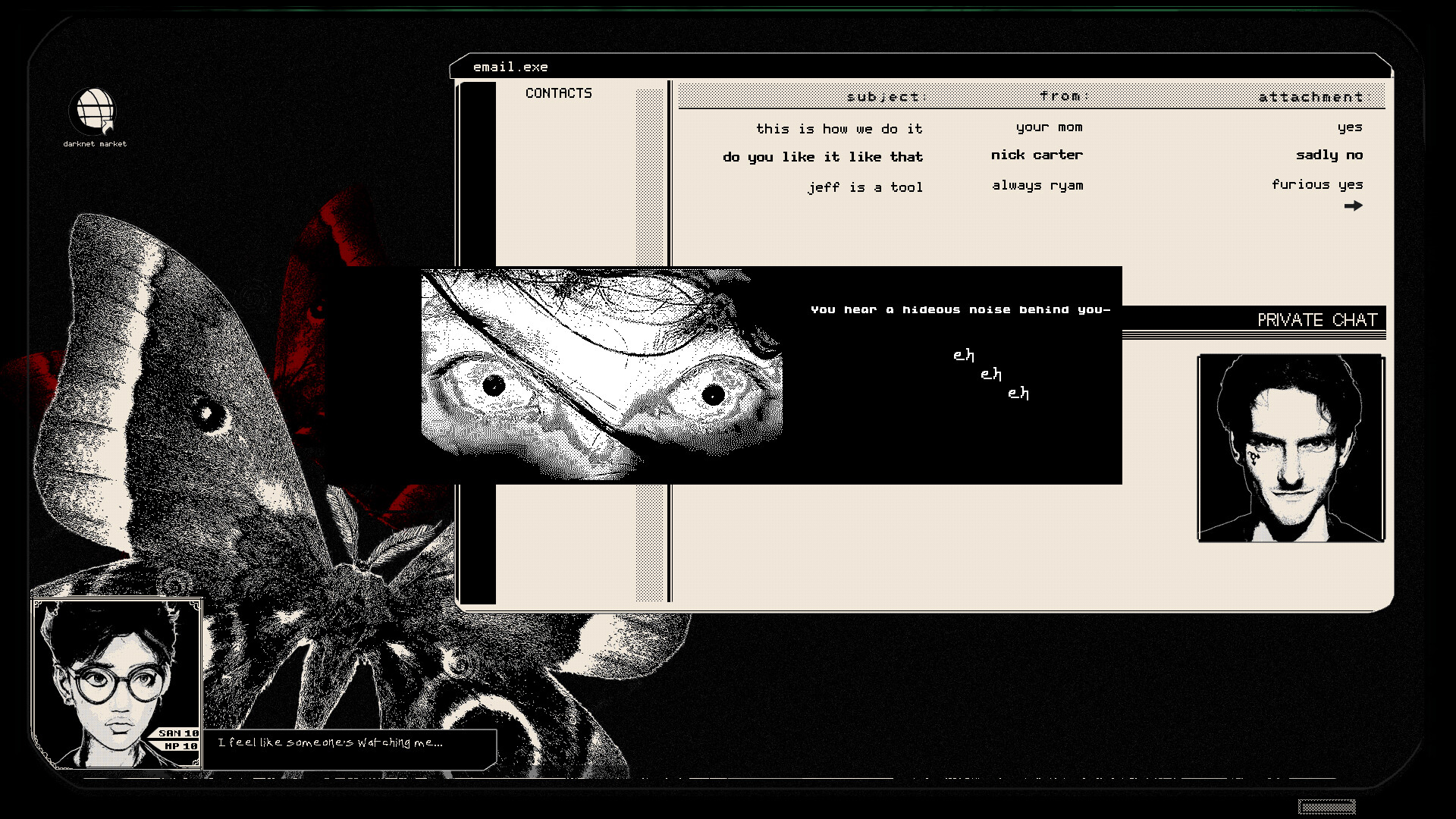
The phrase 'dark web' is one most of us have been taught to fear. Supposedly brimming with all manner of illegal activity, unsavoury individuals, and horrible things being done to good people, it makes sense that few feel they've the stomach to face it. While we are probably right about that, Ryan sees it differently.
"Dark web is a personal reference for me," she says. "The Tor network, which is the dark web that we speak of, is actually a very chaste version of what we think is this dark internet full of secrets. I really, genuinely feel that the 90s web era was the real dark web, before Google came in. Things weren't really indexed in the same way that the Tor network isn't really indexed. So you had to really dig around." As an example, Ryan tells me how she's "95% positive" that she saw infamous German cannibal Armin Meiwes at work on one such dug-up forum. Specifically, "the post that Armin had made, and the response from the person whose name I can't recall, who ended up being eaten." Her wide eyes reflect the computer screen before her, casting a glare over both our faces on this patchy video call. The clock hits 1am, and you know what? I'm inclined to believe her.
In short, not only has Ryan visited the dark web herself, she's played around with it. "I actually have websites hosted on the Tor network that are for people to find," she smiles. "I love to seed mysteries across the world."
Cannibals in search of their next consenting victims aside, Ryan's unique take on an indie horror game has led her to confront other sorts of demons – and I'm not talking about the ones with pointy horns. "Demons...are metaphors in a way," she muses. "I always describe [darkwebSTREAMER] as a psychological horror game. I don't mean psychological horror like 'oh no, I'm afraid of the demon', I mean, we're really investigating the darkness of humanity when we are exploring these websites. We're exploring what you, as the streamer, are willing to do to yourself for the people in pursuit of social clout. It is that observation of the internet past and the darkness of that space as well as contemporary darkness around us, almost like a collective loss of humanity in the objectification of ourselves in pursuit of subscribers, capitalistic gains, or social credit."
Sign up to the GamesRadar+ Newsletter
Weekly digests, tales from the communities you love, and more
So, what does it feel like to play darkwebSTREAMER and experience this heavy metaphor at work via a simulated 90s computer screen? Ryan describes the game as a "narrative roguelike" of sorts, where no two one-hour playthroughs will ever be the same.
Method and the madness
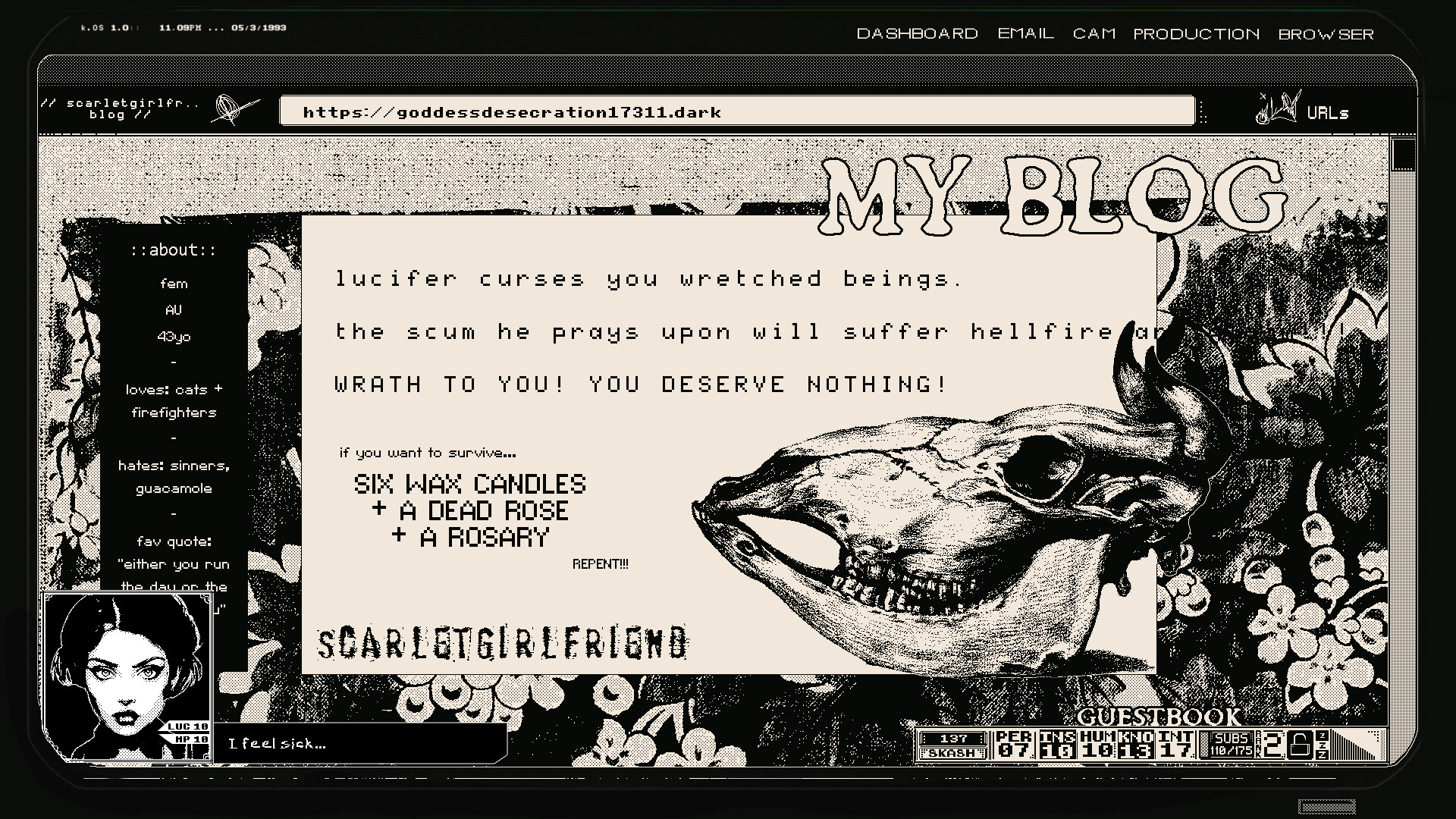
You're strategizing based on what is available to you during your playthrough, which will radically change the kind of story experiences you're having.
Chantal Ryan
Achieving a narrative, text-heavy game with so many different outcomes and pathways sounds exhausting, especially from a two-person team. The workaround is "an AI system that generates narrative in order to populate these [online] worlds," she says of the procedurally-generated internet that became the game's claim to fame right from the get-go. "I've always been fascinated by AI. I've always been really enamored with things that talk back."
In creating darkwebSTREAMER this way, Ryan has come up with a "procedurally-generated roguelike" experience that deals less with RNG as it does with actual user input. Basically, the dark web you experience in-game is listening and responding to choices that you make.
"In theory, people can say the same sentence 100 different ways depending on who they are, their personality, their cultural, linguistic, geographic backgrounds. So I kind of just took that logic and I was like, 'I'm sure I can write a system that enables people to say the same thing in very different ways depending on their personality'." These language generation tools aren't the ones you might be thinking of when it comes to the AI sphere. "It's all ethical," Ryan says. "It's all handmade datasets, and the only hallucination is our intended hallucination. So it's very video game-functioning and appropriate."
In playing your character a certain way, darkwebSTREAMER allows you to lean into the RPG elements and craft who you are. That means that there are many different ways your character might respond to the dark web and its contents, depending upon where you go clicking.
Much as in a roguelike, "the internet is the dungeon," explains Ryan. "A lot of the choices you're making will depend on what you find online, what websites you find, or which services you access. Did you find a doctor? Did you find a therapist? Did you find a demonologist? Or a witch? Or an antiquarian? Did you find this weird-ass marketplace? There's tons and tons of pages, and you're not going to find all of them every time. You're strategizing based on what is available to you during your playthrough, which will radically change the kind of story experiences you're having."
With no playable darkwebSTREAMER demo currently available to the public, I had to ask Ryan what the general reception has been so far from the lucky few who've gotten to play it at events. "I genuinely had no idea how people would receive the game," says Ryan of the first time she publicly showed the game at PAX 2022. "I had some presumptions. I was like, this game probably won't sell very well, it's very reading heavy." But then, something happened that got her "anthropologist brain turning".
"I remember multiple times just turning around and realizing there were crowds, thick crowds of people around us, people craning to get a look at this game. I watched people queue for an hour to play, and people were bringing their friends back. And then their friends were bringing back friends. It was bizarre." Not only did everyone want to play darkwebSTREAMER, but a lot of them were happy to merely watch. In some ways, that's even weirder. But is it?
Fear itself
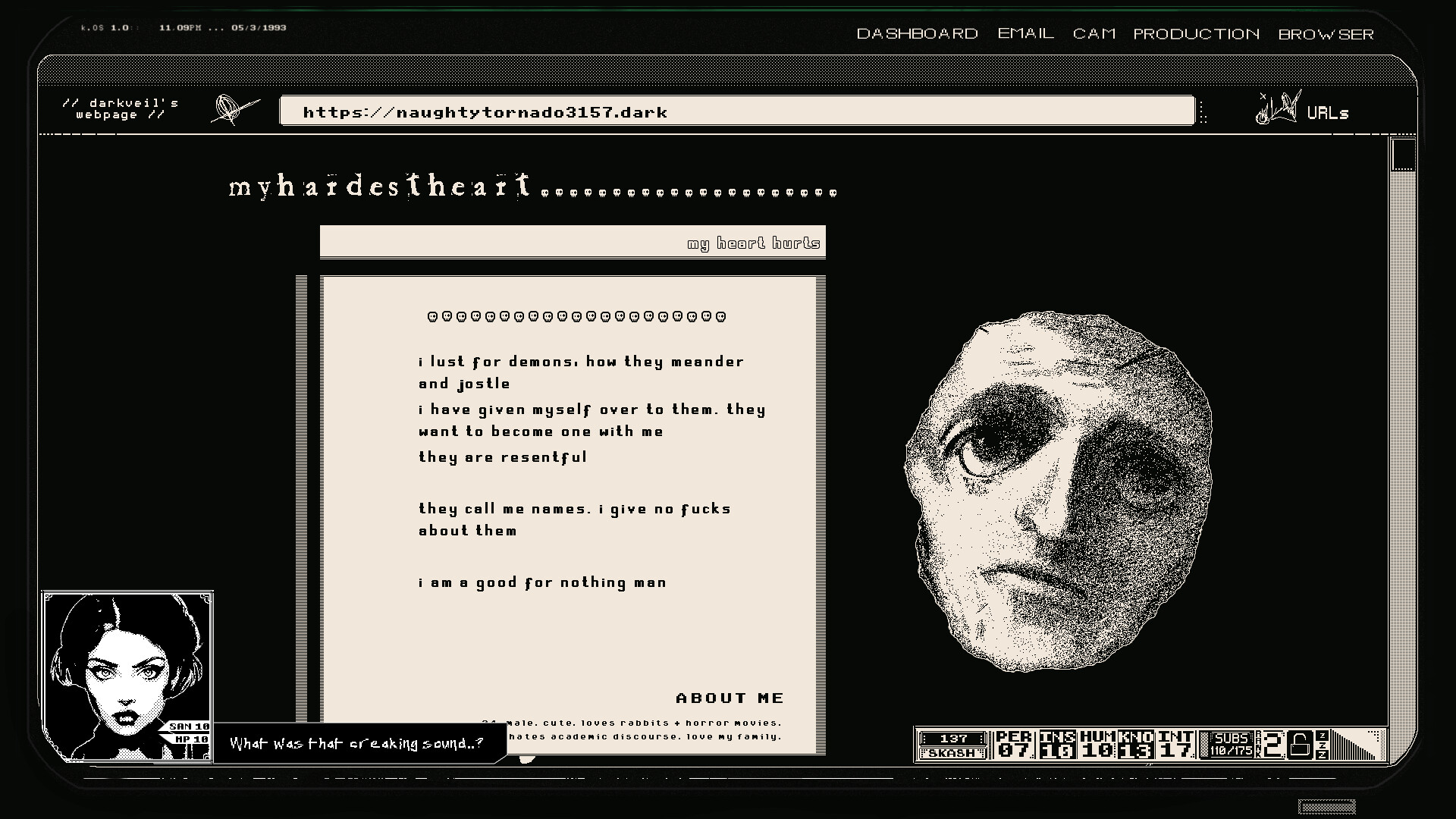
I always feel most alive when I'm in that environment of suspended animation. I feel deeply alive when I know that there's the possibility of death.
Chantal Ryan
This voyeuristic element of watching others in positions of fear and discomfort is interesting in itself. "I thought to myself, 'What is it about this text-based game that is really turning people into spectators and getting them so invested?' I think it's because so much of it is psychological, and it's very personal in many ways." Personal, yes, but it's also topical. How many of us have watched a Let's Play on YouTube, or subscribed to a Twitch channel to watch other people play games, horror or otherwise?
When it comes to horror, Ryan and I agree on the strange level of protection that comes with being the observer rather than the observed. "People enjoy watching what kind of violence other people are going to experience. It's the threat of violence or conflict, and they're interested in the psychological effects and implications of what's going on. Maybe I'm very biased because like I'm really into that shit," she laughs. "Maybe there's a totally different reason people would literally crowd to watch [darkwebSTREAMER], but I did not expect that. It was almost like a performance art scenario, even though I conceived it very much as a private, in-the-dark experience, alone and quiet with your thoughts. That's still my favorite way for people to play it."
darkwebSTREAMER proves that what makes horror such a magnetic, emotional game genre isn't always jump-scares, monsters, or creepypastas found on some long-forgotten subreddit. Fight-or-flight triggers a unique response in all of us, toeing the precipice of life and death. Maybe existential horror is its only true form? That seems to be the case for Ryan, anyway.
"I am the most immune horror person ever. I love horror because I seek that feeling of fear. One of my favorite things to do is to go to the ocean and swim out as deep as I can, like way farther than anyone else around me, and I'll swim until I have no idea how deep it is below me, and I just exist. I'm in between here and the sky and the depths of the ocean, and I have no idea what's below me." Ryan admits to living in a "very shark-y place" in Australia, with a low yet very real risk of getting chowed down. "There's a feeling of safety in statistics," she jokes.
"But this small possibility, knowing that things aren't in my control…I always feel most alive when I'm in that environment of suspended animation. I feel deeply alive when I know that there's the possibility of death. And that is, I think, what, partly what horror does for me, is when when it happens, the feeling I seek is that feeling of there being more to this world than meets the eye. Yes, that's scary, but also very invigorating and exhilarating. "
It's a perfect allegory for what she witnessed at PAX 2022. "Some people love to be in the ocean, with the fear of god-knows how much water is below them, and some people like to watch a video about someone doing just that. It's two very different kinds of people. The ones I get sad about are the people who won't engage with it at all. It's almost not being a good neighbor, to turn a blind eye from our mortality." At the end of the day, for Ryan, "being a horror artist is exactly that: it's about standing with people and holding their hand in the face of things that are scary. It is refusing to abandon people who don't have the choice in facing down scary things, and choosing to stand in solidarity with them instead."
Check out some of the awesome upcoming horror games still to come in 2024 and beyond, from Killer Klowns to Silent Hill 2.

Jasmine is a staff writer at GamesRadar+. Raised in Hong Kong and having graduated with an English Literature degree from Queen Mary, University of London in 2017, her passion for entertainment writing has taken her from reviewing underground concerts to blogging about the intersection between horror movies and browser games. Having made the career jump from TV broadcast operations to video games journalism during the pandemic, she cut her teeth as a freelance writer with TheGamer, Gamezo, and Tech Radar Gaming before accepting a full-time role here at GamesRadar. Whether Jasmine is researching the latest in gaming litigation for a news piece, writing how-to guides for The Sims 4, or extolling the necessity of a Resident Evil: CODE Veronica remake, you'll probably find her listening to metalcore at the same time.
